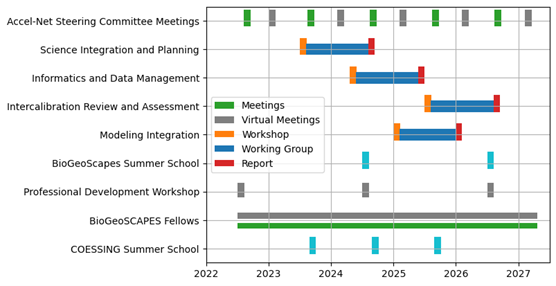What is BioGeoSCAPES?
Earth’s life support system is underpinned by microbial biogeochemical cycles, where essential elements are transformed and recycled within the environment. Despite over a century observing Earth’s biogeochemical cycles, we still lack fundamental knowledge about the environmental and microbial controls on these essential biogeochemical cycles. This knowledge is necessary for understanding the response of the Earth system to human perturbations.
An international community effort has been underway to create a global-scale research program called BioGeoSCAPES by the mid-2020’s to improve our understanding of the microbial biogeochemistry of the oceans. The BioGeoSCAPES program will involve multiple scales of study, from regional processes to ocean basin-scale, and combine the capabilities of new omic and micronutrient techniques to provide a comprehensive understanding of biogeochemical dynamics and connect them with a numerical pipeline that integrates computational biology and ocean biogeochemical modeling. BioGeoSCAPES will be underpinned by robust interoperable data standards and intercalibration efforts to create an international interoperable data system that nations around the world can contribute to and participate in. BioGeoSCAPES would create the first global scale microbial maps revealing the distribution of microbes and their genes in every ocean basin, mapped at the same density we can map macro and micronutrient distributions. From resultant global ocean datasets, BioGeoSCAPES would enable a new generation of ocean ecosystem modeling that integrates omics data and transforms our understanding of how the oceans operate.
To enable the launch of BioGeoSCAPES, an Acceleration of Networks (“AccelNet”) grant from the US National Science Foundation was obtained that will support international activities. AccelNet is a program that focuses on the development of international collaboration. AccelNet does not fund scientific research activities directly, instead it offers support to build the “networks of networks” needed for international collaboration through workshops and educational exchanges.

This AccelNet project will build the network-of-networks required to develop foundational scientific and infrastructural components of BioGeoSCAPES through community activities, including workshops and working groups focused on 1) the development of a detailed, globally-supported science plan; 2) the identification of key scientific interests and expedition goals with international thematic meetings; 3) the development of intercalibration and standardized best practices and data integration and management plans that combine international efforts into cohesive interoperable global data products; 4) the integration of modeling efforts across a range of scales; and 5) the identification and development of logistical and infrastructure needs to support such an effort. There will be a particular focus on early career scientist exchanges to facilitate both the development of a new generation of interdisciplinary scientists and enable key technical exchanges internationally. Finally, we will develop and implement the program governance through the formation of an international Science Steering Committee and subcommittees, building on the model used by other international-scale marine science programs such as GEOTRACES, IMBeR and SOLAS. These committees will prioritize broad and equitable engagement with the diverse constituencies, which will be essential to successfully launch BioGeoSCAPES. These efforts will foster the development of the BioGeoSCAPES program in coordination with the efforts of international colleagues, with the goal of establishing leadership, science plans, infrastructure, data management capabilities, and national funding resources in place by the end of the grant, enabling progression towards the launch of a BioGeoSCAPES program by the mid-2020’s.
BioGeoSCAPES is supported by Ambassadors representing 27 nations. In preparation for the first BioGeoSCAPES International Science Planning meeting in the Fall of 2023, we asked nations to organize BioGeoSCAPES national planning workshops to inform the international organizing committee of how each nation could become involved in and be supported by a BioGeoSCAPES program. Reports from these national meetings were used to develop the themes of the Science Plan, which was collaboratively outlined during the 2023 International Science Plan Meeting. Writing groups have been formed for each of the main Science Plan chapters, which will be collaboratively written by a group of volunteer champions of BioGeoSCAPES during the spring of 2024.
How Can I Get Involved?
Over the next four years, the BioGeoSCAPES Accelnet will host virtual and in-person activities to prioritize and plan foundational components of a collaborative international BioGeoSCAPES initiative, including Modeling & Data Integration, Standardization & Intercalibration, and Informatics & Data Management. These activities may include webinar series, topical workshops, and smaller group planning meetings. We are seeking YOUR collaboration and leadership to help plan these activities. The Accelnet will also include numerous education/capacity building & professional development activities. Please click here if you wish to be involved in a particular aspect of the Accelnet.
